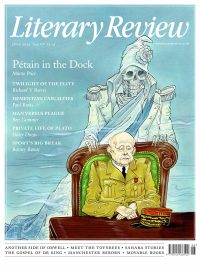Alan Ryan
Sparks of Revolution
Life, Liberty and the Pursuit of Happiness: Britain and the American Dream (1740–1776)
By Peter Moore
Chatto & Windus 512pp £25
Life, Liberty and the Pursuit of Happiness is a sort of pre-history of the American Revolution. ‘Sort of’ because it is a history told through episodes in the lives of, primarily, Benjamin Franklin and the London printer William Strahan, as well as those of Dr Johnson, John Wilkes, Catharine Macaulay and Thomas Paine. The American Revolution breaks out at the end of the book, but it casts its shadow a good deal earlier.
The book opens in 1740, when Franklin, aged thirty-four, was already a well-known figure in Philadelphia as the author and publisher of Poor Richard’s Almanack, the source of such famous aphorisms as ‘Early to bed and early to rise, makes a man healthy, wealthy, and wise.’ He conceived an ambition to create an American version of Joseph Addison’s Spectator, but was betrayed by a collaborator, who took the plan to a rival publisher, and was eventually stymied by the absence of a market for one such magazine, let alone two. It did not interfere with his other projects, such as the creation of what would become the University of Pennsylvania.
In 1743, a friendship began that only the start of hostilities between the American colonists and the British army would put an end to. William Strahan, a Scot, was already a successful printer and publisher when he wrote to Franklin to ask him to help a young protégé,

Sign Up to our newsletter
Receive free articles, highlights from the archive, news, details of prizes, and much more.@Lit_Review
Follow Literary Review on Twitter
Twitter Feed
Under its longest-serving editor, Graydon Carter, Vanity Fair was that rare thing – a New York society magazine that published serious journalism.
@PeterPeteryork looks at what Carter got right.
Peter York - Deluxe Editions
Peter York: Deluxe Editions - When the Going Was Good: An Editor’s Adventures During the Last Golden Age of Magazines by Graydon Carter
literaryreview.co.uk
Henry James returned to America in 1904 with three objectives: to see his brother William, to deliver a series of lectures on Balzac, and to gather material for a pair of books about modern America.
Peter Rose follows James out west.
Peter Rose - The Restless Analyst
Peter Rose: The Restless Analyst - Henry James Comes Home: Rediscovering America in the Gilded Age by Peter Brooks...
literaryreview.co.uk
Vladimir Putin served his apprenticeship in the KGB toward the end of the Cold War, a period during which Western societies were infiltrated by so-called 'illegals'.
Piers Brendon examines how the culture of Soviet spycraft shaped his thinking.
Piers Brendon - Tinker, Tailor, Sleeper, Troll
Piers Brendon: Tinker, Tailor, Sleeper, Troll - The Illegals: Russia’s Most Audacious Spies and the Plot to Infiltrate the West by Shaun Walker
literaryreview.co.uk